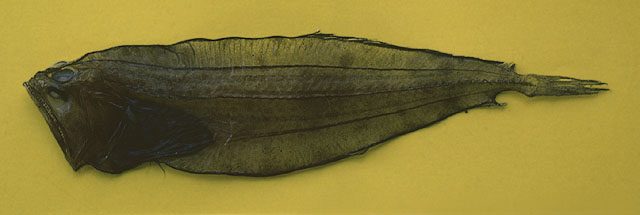| Bothidae (Lefteye flounders) |
| 40 cm TL (male/unsexed) |
|
bathydemersal; marine; depth range 60 - 3210 m |
| Circumglobal: tropical; from the Western Atlantic to Western Pacific. |
|
Dorsal spines (total): 0-0; Dorsal soft rays (total): 111-127; Anal spines: 0-0; Anal soft rays: 76-88. Body flexible. Mouth extremely large, maxillary not projecting beyond tip of snout. No canine tooth. Tip of lower jaw slightly beyond the upper; upper jaw shorter than head length. |
| Inhabits the deeper continental shelf to depths of almost 1,000 m (Ref. 27121). Found on sand, mud and clay bottoms (Ref. 4417). Feeds on larger benthic animals (Ref. 30573). Minimum depth reported taken from Ref. 30573. |
|
Least Concern (LC); Date assessed: 13 May 2014 Ref. (130435)
|
| harmless |
|
Museum: Balayan Bay, Luzon, USNM 138016. Gulf of Davao, Dumalag I. USNM 138017. Northern Mindanao, USNM 138018. Luzon coast, USNM 138019-20 (Ref. 11790). Also Ref. 393, 559. |
Source and more info: www.fishbase.org. For personal, classroom, and other internal use only. Not for publication.

